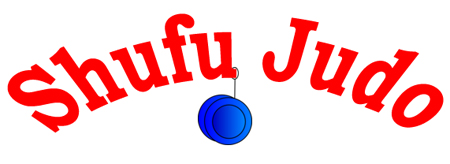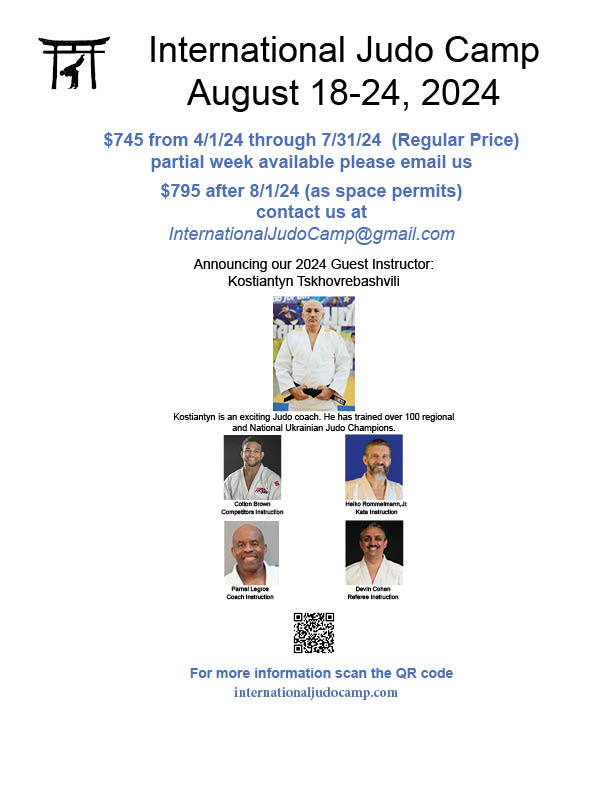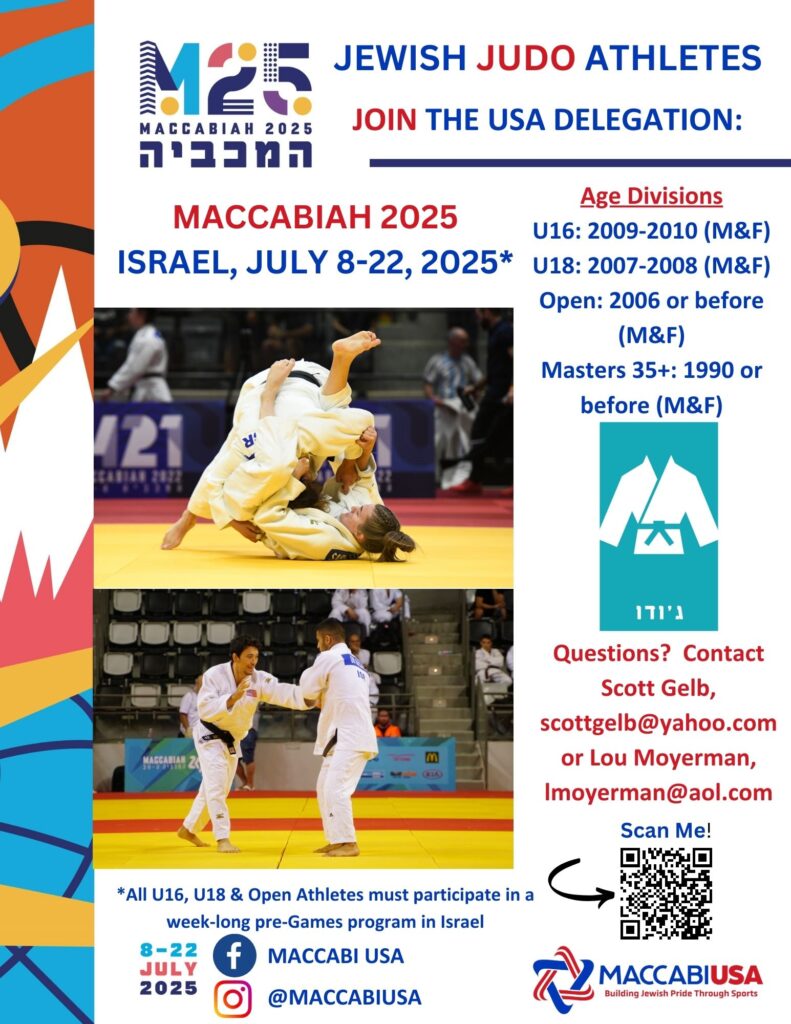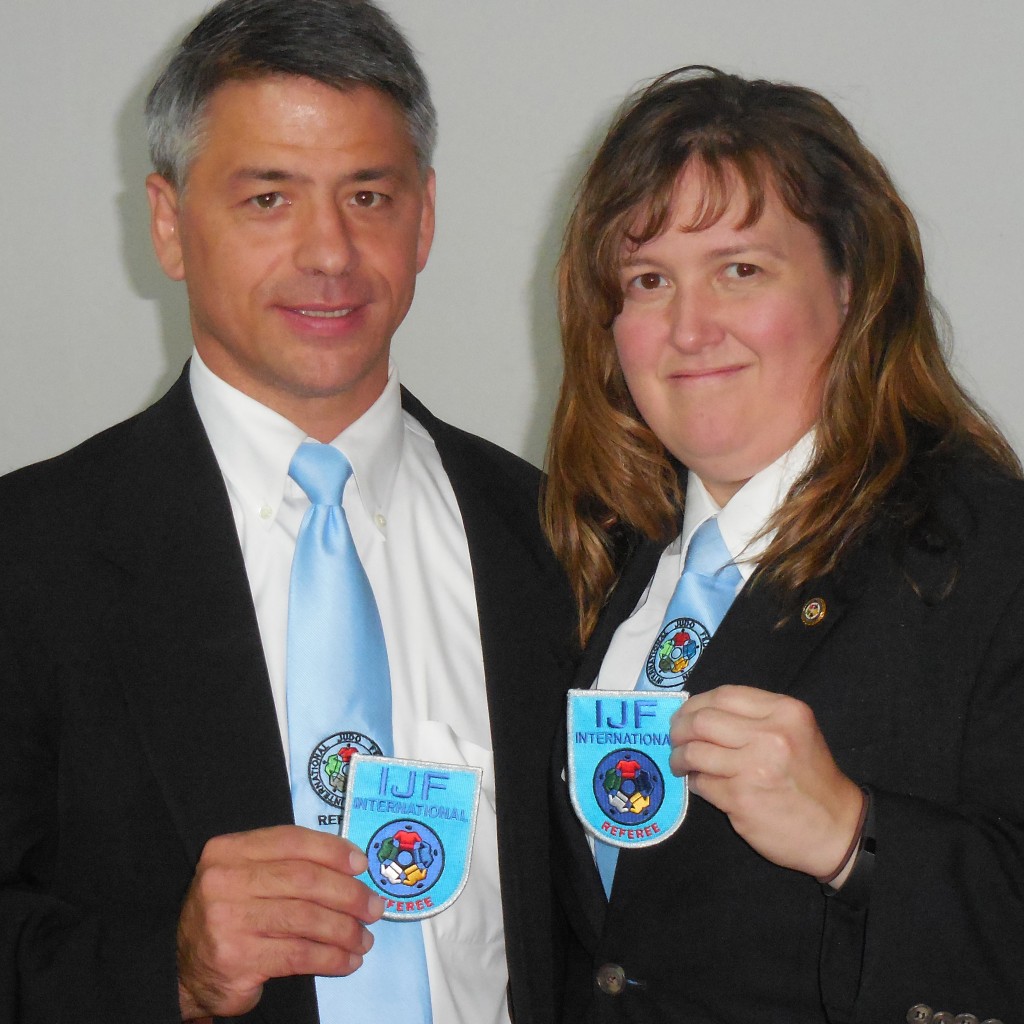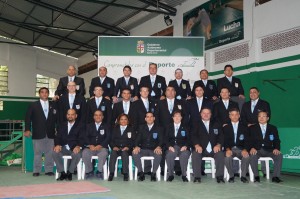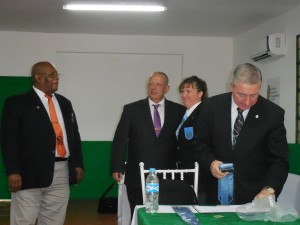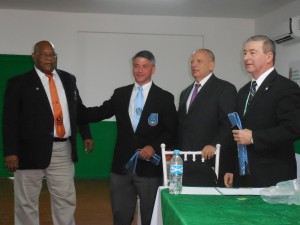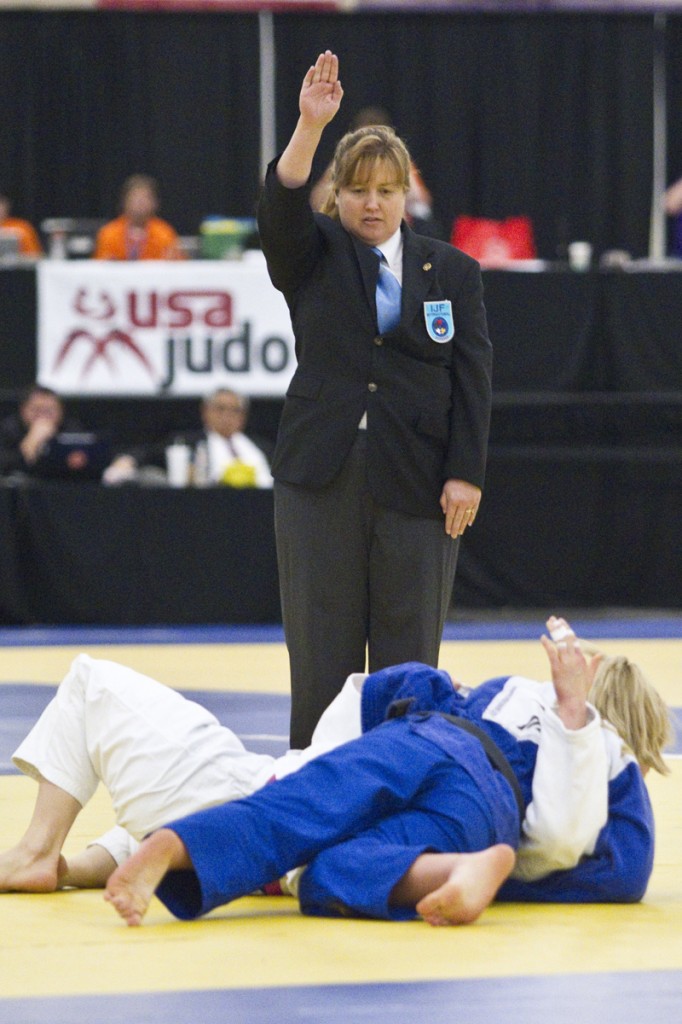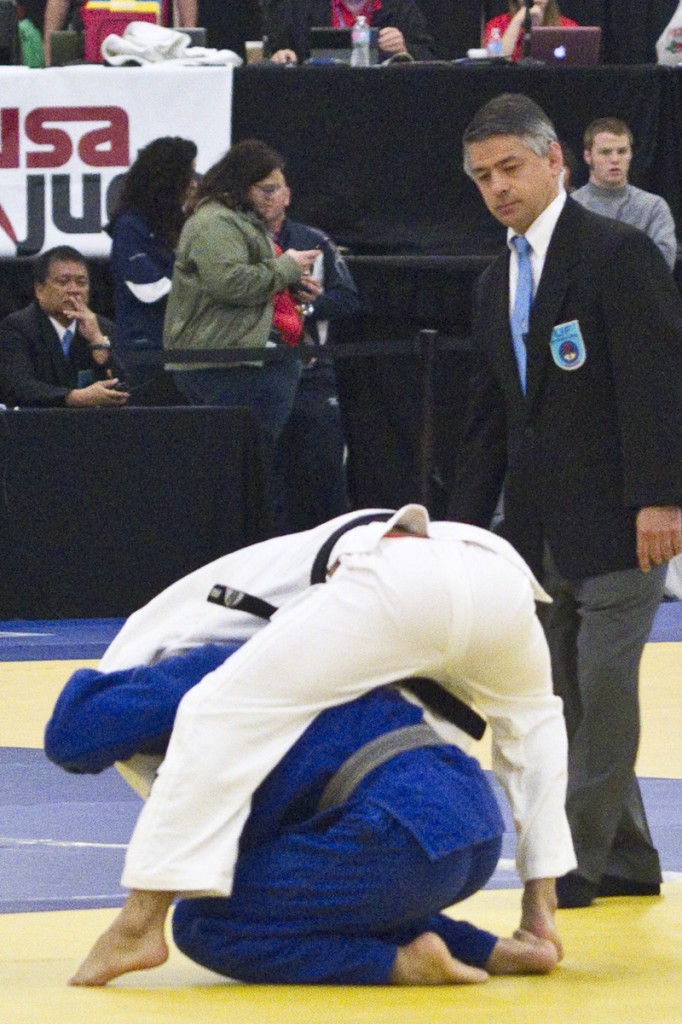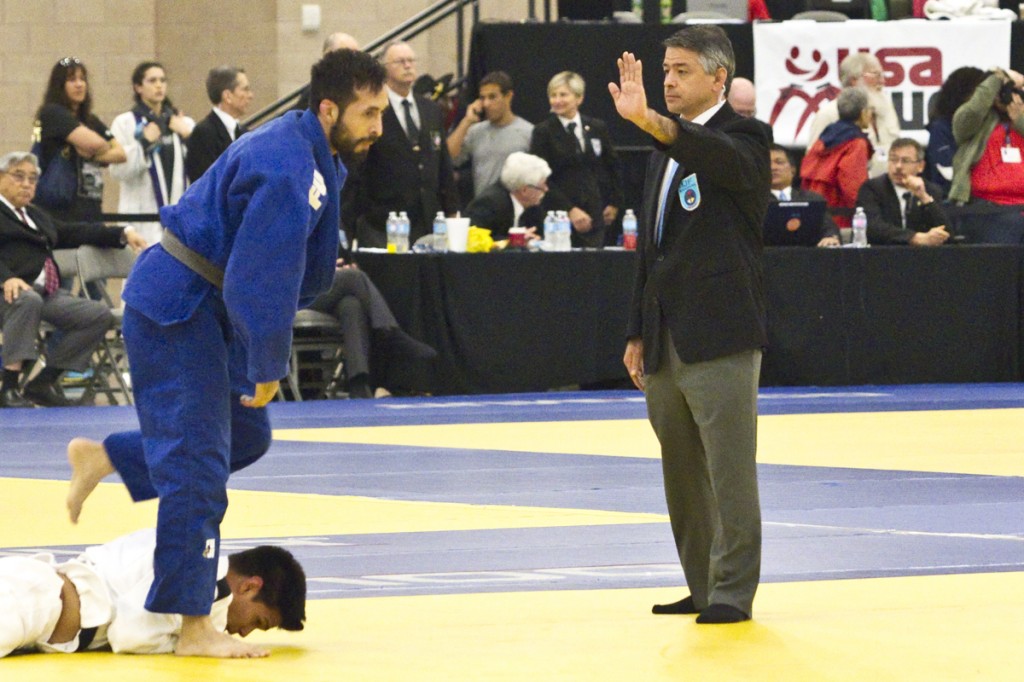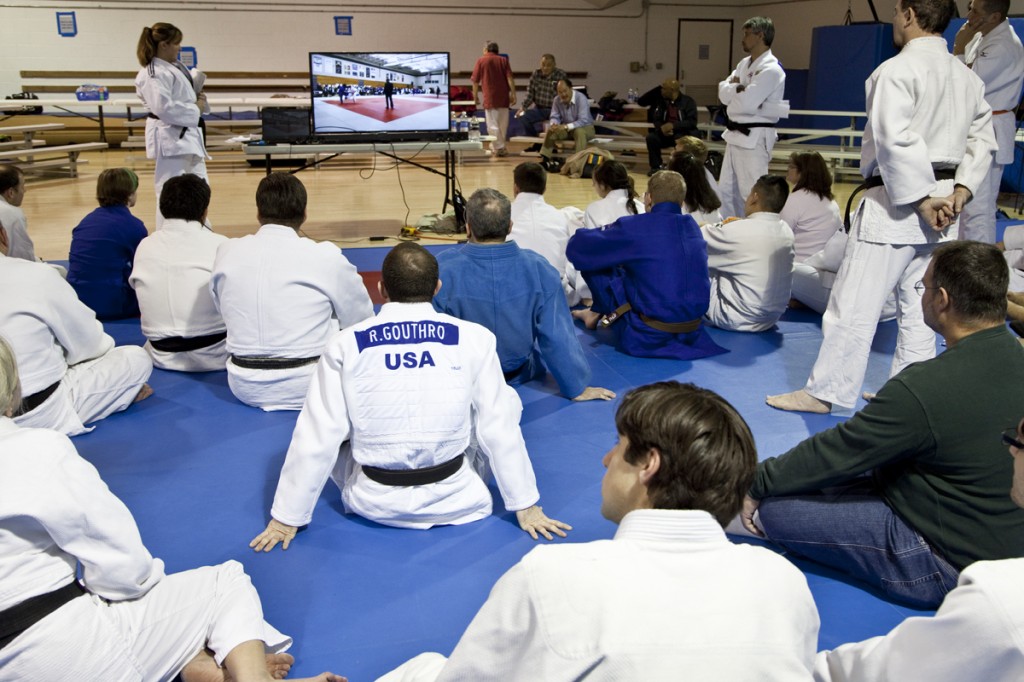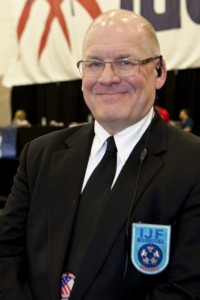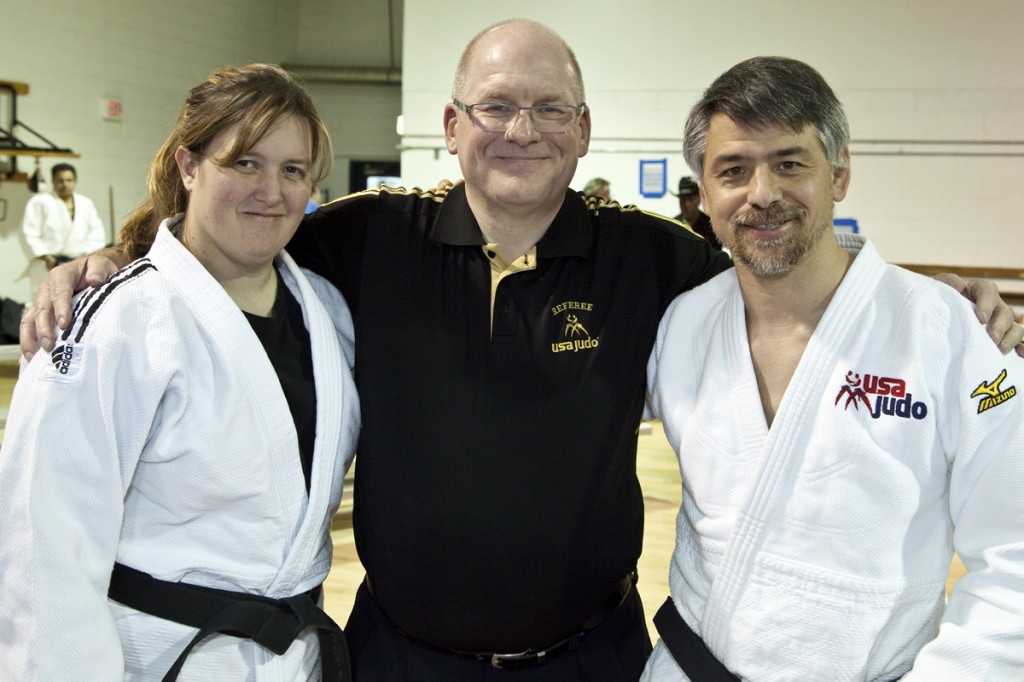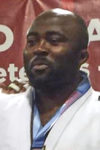In September, 2015, Shufu members Karl Tamai and Sharon Landstreet traveled more than 4,000 miles to Santa Cruz, Bolivia, for the three-day South American Championships for one of the most important events of their long judo careers. After many years of study, practice, and officiating at judo competitions from local promotional events all the way to major international tournaments, they were on their way to be examined for elevation to IJF-A, the prestigious top refereeing level of the International Judo Federation.
Such an honor – to be selected for IJF-A examination, comes only after years of climbing the referee certification ladder through the ranks of local, regional, national, and Pan American certifications, and being evaluated by the top judo referees in the world. The aspiring referee must do this not only during local, single day competitions, but through the multiday international competitions held in the Americas, Europe, Asia, Australia, and Africa. These trips typically involve many days away from family, friends, and work, and are almost always paid for out of their own pockets, with only occasional, minimal stipends, a shared hotel room, and food at the tournaments.
The examination was conducted by a representative from the IJF Referee Commission and two other referees: one from the Pan-American Judo Confederation and one from the European Judo Union. Each of the candidates officiated matches as a center referee and also as a judge. They were also evaluated on teamwork and conduct off the mat.
Karl Tamai, Godan (5th degree Black Belt) and sensei at the College Park (Maryland) Judo Club, described what it was like being a candidate for IJF-A. “Bolivia was a good competition, with about a hundred players – it was the South American Championships. The pressure we felt from testing and having eyes on you all the time was the difficult part. You have to learn to relax and just call the match.”
The event was three days in duration, with two days for individual competition and the last day for team matches. At the end of the tournament, the referee candidates were called together for the announcement of the results.
Sharon Landstreet, Yodan (4th degree Black Belt), and sensei at the Arlington Judo Club in Arlington, VA, described the scene as the results were announced. “…all candidates sat together as they announced who passed. If your name was announced, that meant you passed the exam. As each name was announced, we came up to receive our new referee patch and an IJF tie and shook hands with each evaluator.”
When asked about what she was feeling at the time, Sharon said, “As they got closer to finishing announcing the successful candidates for the IJF-A exam, you just listened, hoping to hear your name announced. I was also sitting next to fellow candidates who passed and those who did not pass their IJF-B and IJF-A exam. Thoughts are going through your mind – how do I react if I pass or if I do not pass? When my name was announced, a huge weight was lifted off my shoulders and words can not express how happy I felt but it was also difficult to be happy when some of my fellow referees did not pass. After all of the names were listed, everyone started taking pictures and hugging each other. Many of us took pictures with the Referee Examiners as well.”
And even referees can celebrate, as Sharon continued: “Several of the referees got together at the hotel and had drinks at the hotel pool. It was a low key celebration but nice because everyone was there for each other. It was a chance to relax, discuss the past few days and bond as friends.”
Sharon and Karl also spoke about their paths to the top tier of refereeing.
When did you begin your study of judo?
Sharon: “I started when I was six years old and my parents were my instructors. I took a break from judo during high school and college and came back when I was done with college”
Why do you do refereeing?
Karl: “I got into refereeing as a way to give back to those who came before me. When I was a little kid, there were people like Jimmy Takemori and John Anderson who were busy refereeing while I competed. My dad (Ken Tamai), Jack Fetrow, Dave Hamlin – those were all the guys who supported judo as referees so that I could participate and have a good time fighting.
“Now that those people are not refereeing any more, we need to replace them and have other people step forward and give back. So that’s why I got into refereeing.”
Sharon: “I’ve always seemed to have the ability for refereeing sports. I refereed high school softball and intramural sports in college where I had to learn how to referee water polo, basketball, flag football, soccer, volleyball, and floor hockey for the intramural program that the college offered. I find that I am able to referee sports if you provide me a set of rules and an overview of the sport.
“I learned from my dad and my high school softball coach that it is important to know the rules.You need to know the rules so you can have a conversation with other coaches and referees about situations that occur during games and matches. This knowledge is important as a player, coach, and referee.”
How did you decide you wanted to be at the top rank of judo referees?
Sharon: “I never decided, but with every year that I did it, I just wanted to get better and better and better and that’s what pushed me. I always wanted to be the best referee that I could be at any level that I was.
“It worked out that I got opportunities to test for the various levels of referee and had encouragement and support from people who I refereed with or trained with.”
Karl: “I travel up and down the east coast and across the nation taking kids from our club to national events, not because I was trying to climb the ladder of refereeing, just because I was trying to give back. In the course of doing so, my refereeing gradually improved to that level.
“I took my national certification, and I moved up with certifications. I was encouraged by Roy Englert (Shufu’s Referee Chairman) to take the next step. For me the purpose of refereeing was not to be the world’s greatest referee or to be the number one referee. It was always just to give back.
“But he, like a good sensei, saw more potential in me than you necessarily see in yourself, and encouraged me to take that next step and test for PJC-C and for IJF-B and then for IJF-A. It was really Roy guiding me and encouraging me and keeping me going in the right direction that got me here.
“I was a national referee for ten years, an IJF-B for five or six years, PJC for two or three years. I wasn’t in a hurry to get anywhere, I was just in a hurry to give back.”
How do you prepare for a refereeing event or stay cool during a refereeing examination?
Sharon: “I do a lot of video prepping. I watch a lot of live international matches. Whenever I can, I watch the international events that are broadcast by the IJF, EJU, and PJC. I watch to see how the other referees call matches, watch the players to learn and understand the techniques being used by the athletes. It is important to understand all judo techniques and every way the technique can be applied.
“I also practice scoring matches during randori (free practice) at my judo club.”
Karl: “Uchikomi, uchikomi, uchikomi. You’ve just got to do it over and over and over again so that you don’t think about it. You’ve got to go to all the national events you can, go to all the international events you can so that you get comfortable.”
You are now an IJF-A referee – What does this mean to you?
Sharon: “I have a friend who is an international referee, and she says that “now the hard work really begins.” So now it’s a matter of improving my refereeing skills, refereeing at high level tournaments, helping up-and-coming referees get better, staying humble and keep learning techniques because they’re always changing and athletes have different methods of applying techniques. Just keep learning and improving.”
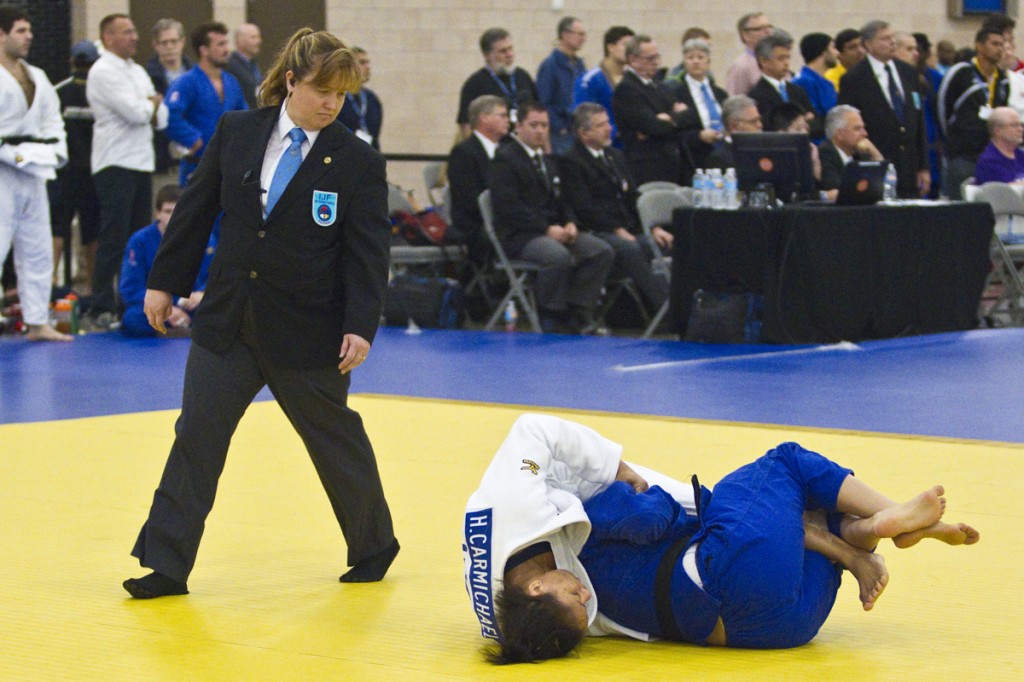
Sharon Landstreet refereeing US World Team member Hana Charmichael’s match at 2016 Senior National Championships
What advice would you give to aspiring referees who want to be the best that they can be?
Sharon: “First you need to enjoy it. Second you need to learn the craft and all aspects of the sport. I may not have been the best competitor or an international competitor, but I understand the sport. I understand the various aspects of a match. While a lot of referees were international competitors, just because you weren’t one does not mean that you can’t become a good referee or a good coach. It’s a matter of willingness to learn and working at it.
“Is it going to be hard? Yes, it’s going to be very hard. There are going to be situations that are hard to deal with. Situations where you’re caught off guard, where you have to make a difficult decision or you have a coach or player who is very upset with you.
“Learning how to deal with these situations and understanding and learning from every match you referee will help you get better. That’s the best advice I can give.”
Karl: “You just start refereeing. You can’t say that other people are going to do it, therefore I don’t need to do it. You have to take the onus on yourself to step forward and referee. And we need referees, so for anybody who is interested, please let us know so we can get you started on that road. You can referee in the dojo during randori, you can referee at local events, but you get started. You approach one of the older referees whether it’s me, or Roy or Sharon or Tad Nalls or Dick Hugh or one of the older referees or a national referee who wants to help get you started. Just getting out there and doing it is going to get you on the right path.
“The first time I refereed at The Liberty Bell, I was scared. A little guy from DC going to this big tournament, and (scared) rightly so. The guys are bigger than you, there are referees you don’t know, there are coaches yelling at you, but I made it through my first Liberty Bell, and every other year it got easier, until now it’s a walk in the park because I got my refereeing uchikomis in. Same thing with the nationals. You go to the nationals the first time, and you think, “O, my goodness, I’m just a little referee – what am I doing at the nationals?” And rightly so – it’s on the national stage. But the more times you do it, the easier it gets. You get your uchikomis in and then you relax and just call the match. Liberty Bell, junior nationals, senior nationals, international competition – you keep on doing it until you’re really comfortable. That’s the only way I know to really become proficient. Just go out there and call the match.”
What was the most important thing that gave you the ability to become an IJF-A referee?
Sharon: “The support and advice I received over the years. Obviously my family was there for me, and there were other people who support me in the USA and my referee friends from other countries.
“I learned a lot from athletes and two of them are my niece and nephew. I just see how hard they work every day to get better in the sports that they play and watch them handle different situations during their games. They inspire me to work just as hard as they do. I have a couple of people who are helping me learn new techniques. They will work with me on the mat or send me videos so I can keep up on techniques used by top level athletes.
“Without that support I wouldn’t be here. You have to have a team that helps you – it’s just like an athlete. An athlete has a team and people supporting them – it’s the same with a referee. If you do not have people who are willing to help you – it’s very hard to do by yourself.”
How often do you look at rule book?
Sharon: “I do look at the rules especially before major tournaments. If I see a different application of a technique, I talk to people who know these techniques. I am always trying to make sure I have the most up to date rules and interpretations. Seeing situations through high level referees’ eyes and understanding why they called it a certain way is important also.
“I had a great situation where I went to call something based on what I thought was the correct call. Robert Fukuda (Head of the USA Judo Referee Commission and Executive Director of the USJF) showed me during a video review, ‘Here’s what I’m seeing and why I wouldn’t call it that way and why I would have called it this way.’ That type of insight from other referees helps you grow as a referee.”
Is there anything else you’d like to say about your career as a judo referee?
Sharon: “I never really thought I would get to this level – IJF-A Referee.
“My father was the first judo referee I ever knew. My parents supported my with every sport I played. One thing they taught me is to understand every aspect of the sports I played. I learned the same lesson from every coach I worked with over the years in judo and with other sports. I can not thank them enough for the insight and support they gave me and continue to give me.”
What’s next for you in the refereeing realm?
Karl: “I’ll take it one step at a time. I just wanted to get through the IJF test. Now I want to focus on giving back to my family, who has sacrificed so much for me to go to these events that I need to put a little time into taking them somewhere nice for what they have done for me.”
Roy Englert was also very happy about their accomplishments. “First and foremost, Sharon and Karl have worked very hard to achieve and to earn these ranks. But we have a long tradition in Shufu of everybody standing on the shoulders of those who came before. And we go back to the tradition of Dr. Koiwai, of Tim Dalton, of Jimmy Takemori and of others, who were national leaders in refereeing and who encouraged, and sometimes cajoled and sometimes berated those who came behind them but always to make sure they got better.
“People know that Shufu has a proud refereeing tradition. They expect more from Shufu referees than they expect from non-Shufu referees and they expect a continued supply of people who will advance at every level, including the very highest levels. And Sharon and Karl are in those very best traditions.”
And a final word from Sharon Landstreet: “When Karl and I got back, we took Roy Englert and Dick Hugh out for dinner to thank them for all of support that they have given to us over the years to get us ready for our IJF-A exam. The only person that was missing from this dinner that we wished could have been part of this dinner was Jimmy Takemori but he was not far from our thoughts that day.”
Shufu can be immensely proud of Karl and Sharon, and also of the great refereeing tradition described by Roy. We are fortunate to have this special opportunity in Shufu to learn from these three top referees and others at and approaching those high levels by watching them on the mat, leading teams, giving clinics, and then emulating their qualities and skills. This incredibly valuable resource is here – let’s use it for the betterment of our own judo and that of others.
Chuck Medani
